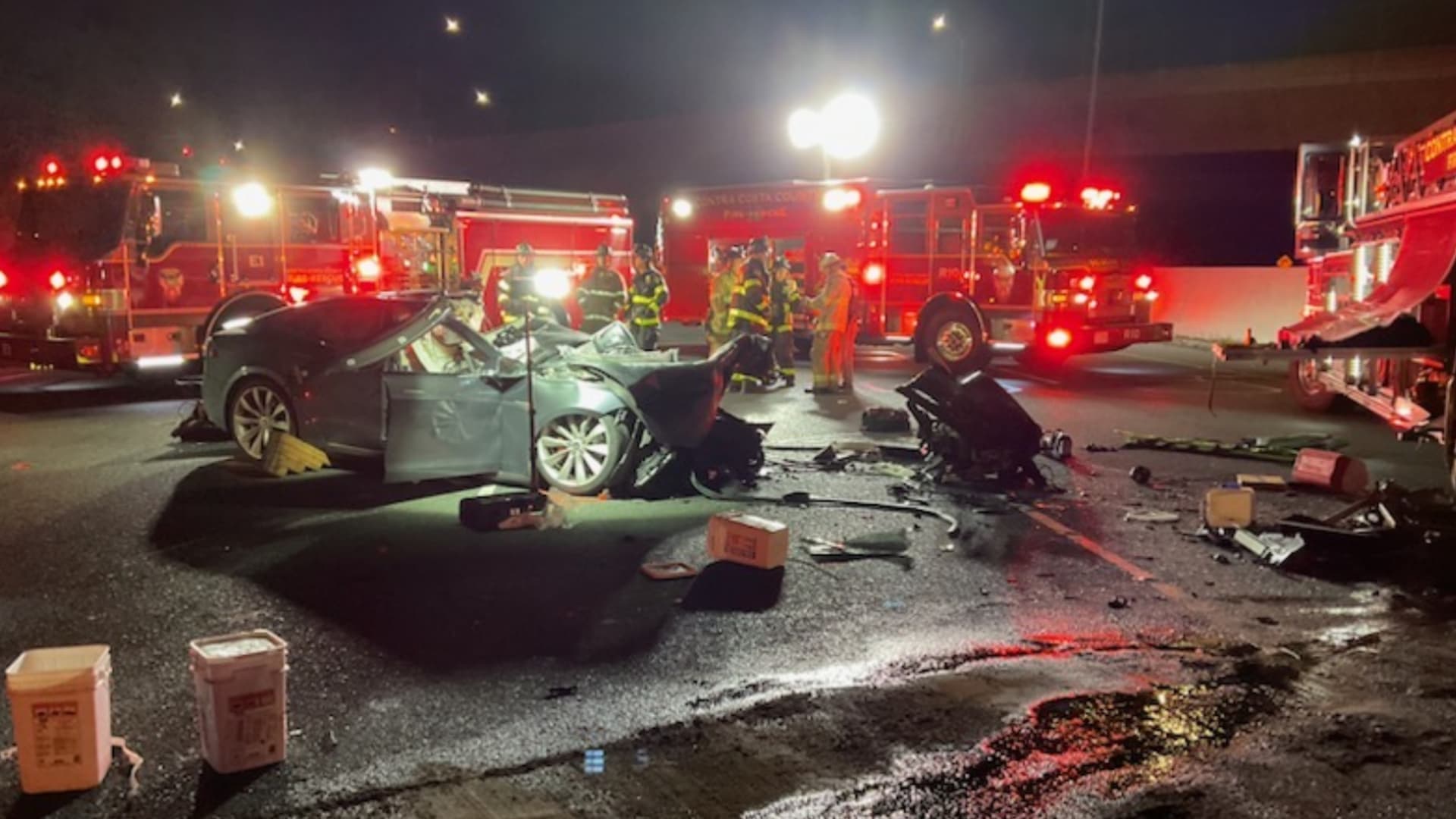In this photo provided by the Contra Costa County Fire Protection District, firefighters are seen at the scene of a fatal accident involving a Tesla and Contra Costa County fire truck on Feb. 18, 2023, in Contra Costa, California.
Contra Costa County Fire Protection District
Federal vehicle safety regulators initiated a new, special crash investigation into a fatal collision that involved a Tesla Model S sedan and a firetruck in Walnut Creek, California, last month, CNBC has confirmed.
The driver of the Tesla died, a passenger was critically injured and four firefighters who were inside the firetruck were taken to a hospital following the crash, according to records obtained by CNBC from the California Highway Patrol and the Contra Costa County Fire Department.
The Associated Press first reported on the special investigation by the National Highway Traffic Safety Administration.
According to fire department records following the incident on Feb. 18, the firetruck was parked in the middle of an interstate highway in order to protect other first responders who were towing a disabled vehicle from the area at the time the Tesla vehicle veered into it.
NHTSA and CHP have each opened separate investigations into the crash.
The CHP wrote in an statement following the fatal incident, “It is unclear if drug or alcohol influence is a factor in this crash. It was unable to be determined at the scene if the Tesla was being operated with any driver assistance or automation activated at the time of the crash.”
Both CHP and NHTSA want to know whether Tesla’s driver-assistance systems, which are marketed as Autopilot and Full Self-Driving options in the United States, caused the crash.
All new Tesla vehicles in the U.S. come with a standard driver-assistance package called Autopilot. Customers who pay Tesla a monthly subscription fee of $199 or $15,000 upfront can also obtain additional driver-assistance features as part of a premium package called FSD, which stands for Full Self-Driving. Tesla allows FSD customers to sign up for FSD Beta as well, which is a way to test new features that have not been fully debugged on public roads.
Despite their brand names, Tesla does not make a driverless vehicle or system. The company cautions drivers to keep their hands on the wheel, and be ready to take over steering or braking at any moment.
The crash investigation is part of an extensive NHTSA probe of Tesla’s driver-assistance systems, and how they perform around parked first responder vehicles.
According to records on the agency’s website, NHTSA opened a “preliminary evaluation” of Tesla’s Autopilot systems on Aug. 13, 2021. “The investigation opening was motivated by an accumulation of crashes in which Tesla vehicles, operating with Autopilot engaged, struck stationary in-road or roadside first responder vehicles tending to pre-existing collision scenes,” it said.
According to the NHTSA report, at least 14 Teslas have crashed into first responder vehicles while using the Autopilot system.
NHTSA expanded the probe to an “engineering analysis” in spring of 2022, in order to determine if Tesla’s systems may “exacerbate human factors or behavioral safety risks by undermining the effectiveness of the driver’s supervision.”
In lay terms, NHTSA is trying to determine if Tesla’s Autopilot, FSD and other driver-assistance features cause motorists to become so distracted from the road that they would drive more safely without them.
Tesla did not respond to a request for comment. NHTSA does not comment on open investigations.
For all the latest Automobiles News Click Here
For the latest news and updates, follow us on Google News.

